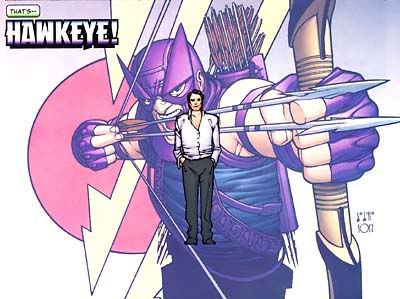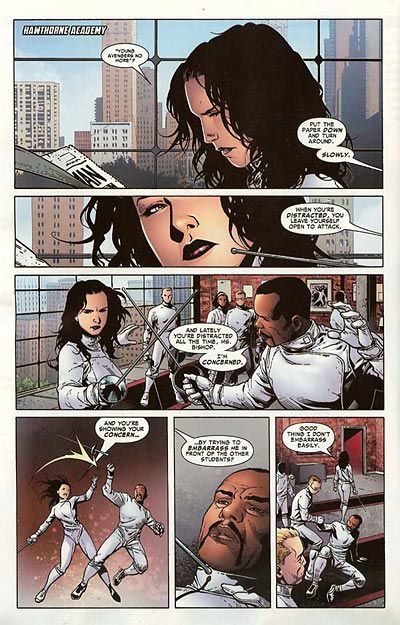She-Hulk #1-2: Jury Duty
One of the first problems to emerge in the trial of Charles Czarkowski is the little matter of pre-trial publicity. Y'see, Czarkowski shot a man while he was being videotaped, and the tape was subsequently run on all the major news shows. This necessarily taints the jury pool, since all of New York is not only aware of the facts of the case, but has actually witnessed them on TV. This makes an unbiased jury very difficult to come by.
Usually, the solution for pretrial publicity is to change the venue of the trial, and move it to another court in another county. But in the Marvel Universe, they have the Time Variance Authority, and with the TVA's aid here, the jury pool is selected from a time before the video hit the airwaves. Publicity problem solved.
If time travel were as safe and easy as it appears in the Marvel Universe, could it be utilized to provide an untainted jury pool in instances like Czarkowski's? Frankly, I'm at a loss to say that it couldn't be done. We're told that the prosecutors agreed to it, and the judge must have OKed it as well. So since there's nothing even analogous to time travel in our caselaw, I'm willing to accept it.
Unfortunately, just because time travel could be used to select a jury pool doesn't mean it was carried out correctly. There are rules governing the selection of jury pools that would still have to be respected. The jurors would still have to come from the venue of the trial (here, New York City), they would have to be relatively diverse demographically, etc. Then a jury of twelve would be selected from the jury pool.
But in #1, there seems to have not been a jury selection stage at all. When Jen and Pug walk into the courtroom, the TVA has already been pulling jurors out of the past. And Jen doesn't say anything until Clint Barton, aka Hawkeye, appears. Juries are selected by the lawyers for each side striking potential jurors until a group of twelve is reached; here, the lawyers don't seem to have done anything during the process. Jen was apparently ignorant that it was even taking place until she walked in mid-way.
(This shouldn't be taken to mean that we should have seen the jury selection. By all means, we shouldn't have. It's the second most tedious part of a trial, after jury instructions. But the events as depicted don't leave room for this stage, even if it's off-panel. It's as if the TVA selected people from the past who automatically became jurors, without any input from the defense, at least.)
Hawkeye, being the good upstanding hero that he is, tries to get out of jury duty. "I just don't do jury duty. Ever. Not my thing." He tries to tell the judge who he is, but Jen twice cuts him off. When Pug asks why she cared so much about that particular juror, she admits that Clint is one of her "closest and dearest friends."
(Quick vocab note. Jen twice refers to Hawkeye as a 'jurist.' 'Jurist' means 'legal scholar' (and often 'judge'), and is not synonymous with 'juror.')
Pug says that Clint should be dismissed, because keeping a friend on the jury is unethical. He's right, more or less. There's not a firm rule stating that a friend of counsel can't be on the jury (usually, the question is asked of potential jurors by opposing counsel), but Jen's conduct in actively keeping that fact from the court is definitely unethical. I don't think it would rise to the level of getting her disbarred, as Pug suggests, but there could be some sanctions imposed by the state bar.
As for the jurors themselves, now there we have a problem or two. Over the course of the two issues, we see several jurors in...interesting clothing. A Revolutionary War soldier. A Puritan woman. A cowboy. An American Indian in native clothing. An Elizabethan woman. A dust bowl farmer. And so on. It certainly makes for an eclectic group, and fun to look at, but they're legally and practically troublesome.
On the more practical side, it would be foolhardy to pull jurors from the 19th century to sit in a 21st century trial. Especially one that is going to involve photographic evidence, not to mention a time travel defense. These people would simply not be equipped to handle a modern American trial. They might be unbiased, but they're also necessarily ignorant of far too much to be good jurors.
Their appearances also suggest a more basic legal problem, going back to how a jury pool is selected. We're told in the story that at least two of the jurors were New Yorkers, so the jury pool would have to be limited to persons living in that county. But some of those outfits don't look like New Yorkers of any time period. Rather, they appear to have been pulled from all sorts of places, and that's not legally permissible, even with the time travel conceit.
Sorry that this wasn't particularly riveting, but next time I'll be addressing the trial itself, and I promise that'll be more interesting.
Usually, the solution for pretrial publicity is to change the venue of the trial, and move it to another court in another county. But in the Marvel Universe, they have the Time Variance Authority, and with the TVA's aid here, the jury pool is selected from a time before the video hit the airwaves. Publicity problem solved.
If time travel were as safe and easy as it appears in the Marvel Universe, could it be utilized to provide an untainted jury pool in instances like Czarkowski's? Frankly, I'm at a loss to say that it couldn't be done. We're told that the prosecutors agreed to it, and the judge must have OKed it as well. So since there's nothing even analogous to time travel in our caselaw, I'm willing to accept it.
Unfortunately, just because time travel could be used to select a jury pool doesn't mean it was carried out correctly. There are rules governing the selection of jury pools that would still have to be respected. The jurors would still have to come from the venue of the trial (here, New York City), they would have to be relatively diverse demographically, etc. Then a jury of twelve would be selected from the jury pool.
But in #1, there seems to have not been a jury selection stage at all. When Jen and Pug walk into the courtroom, the TVA has already been pulling jurors out of the past. And Jen doesn't say anything until Clint Barton, aka Hawkeye, appears. Juries are selected by the lawyers for each side striking potential jurors until a group of twelve is reached; here, the lawyers don't seem to have done anything during the process. Jen was apparently ignorant that it was even taking place until she walked in mid-way.
(This shouldn't be taken to mean that we should have seen the jury selection. By all means, we shouldn't have. It's the second most tedious part of a trial, after jury instructions. But the events as depicted don't leave room for this stage, even if it's off-panel. It's as if the TVA selected people from the past who automatically became jurors, without any input from the defense, at least.)
Hawkeye, being the good upstanding hero that he is, tries to get out of jury duty. "I just don't do jury duty. Ever. Not my thing." He tries to tell the judge who he is, but Jen twice cuts him off. When Pug asks why she cared so much about that particular juror, she admits that Clint is one of her "closest and dearest friends."
(Quick vocab note. Jen twice refers to Hawkeye as a 'jurist.' 'Jurist' means 'legal scholar' (and often 'judge'), and is not synonymous with 'juror.')
Pug says that Clint should be dismissed, because keeping a friend on the jury is unethical. He's right, more or less. There's not a firm rule stating that a friend of counsel can't be on the jury (usually, the question is asked of potential jurors by opposing counsel), but Jen's conduct in actively keeping that fact from the court is definitely unethical. I don't think it would rise to the level of getting her disbarred, as Pug suggests, but there could be some sanctions imposed by the state bar.
As for the jurors themselves, now there we have a problem or two. Over the course of the two issues, we see several jurors in...interesting clothing. A Revolutionary War soldier. A Puritan woman. A cowboy. An American Indian in native clothing. An Elizabethan woman. A dust bowl farmer. And so on. It certainly makes for an eclectic group, and fun to look at, but they're legally and practically troublesome.
On the more practical side, it would be foolhardy to pull jurors from the 19th century to sit in a 21st century trial. Especially one that is going to involve photographic evidence, not to mention a time travel defense. These people would simply not be equipped to handle a modern American trial. They might be unbiased, but they're also necessarily ignorant of far too much to be good jurors.
Their appearances also suggest a more basic legal problem, going back to how a jury pool is selected. We're told in the story that at least two of the jurors were New Yorkers, so the jury pool would have to be limited to persons living in that county. But some of those outfits don't look like New Yorkers of any time period. Rather, they appear to have been pulled from all sorts of places, and that's not legally permissible, even with the time travel conceit.
Sorry that this wasn't particularly riveting, but next time I'll be addressing the trial itself, and I promise that'll be more interesting.




